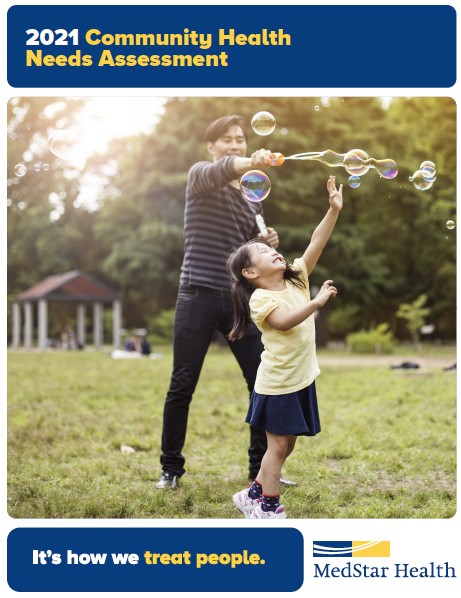Health Systems Administration Department Partners with MedStar Health on New Community Health Needs Assessment
July 7, 2021 – On a three-year cycle, not-for-profit hospitals are required to develop a substantive report outlining the health-related needs of their communities and offering plans for implementation.
This year, the Department of Health Systems Administration at the School of Nursing & Health Studies worked with Georgetown’s academic health system partner, MedStar Health, to develop its comprehensive 2021 community health needs assessment.
“The CHNA allows MedStar Health to better understand local health needs, informing our strategies and partnerships to benefit community health and advance our mission,” the report notes. “It is an organized, formal, and systematic approach to identify and address the needs of underserved communities across our geographic footprint.”
‘Eager and Astute Collaborators’
Dr. Christopher King, chair of the Department of Health Systems Administration, served as the faculty leader on the project, which included the work of a current student and two graduates.

“Engaging students in MedStar Health’s triennial community health needs assessment reflects the department’s commitment to experiential learning,” he said. “Under the tutelage of faculty, students hone their research and analytical skills.”
He highlighted their work, which included “reviewing and synthesizing quantitative and qualitative community health data by race, socioeconomic status, and neighborhood; identifying geospatial gaps in community assets and resources; examining social and economic barriers to healthy living; and uncovering attitudes, policies, and practices that perpetuate poor health in a historically marginalized communities.”
“We loved working with the Georgetown students on this important project,” said Diana Quinn, senior director of community health for MedStar Health. “The students were eager and astute collaborators in developing this report, which will help us to better understand and address the social determinants of health in our communities.”
Applying Academic Concepts
Amelia Bedri (G’20), who received her master’s degree in health systems administration at Georgetown, worked on a community health needs assessment for nearly three dozen hospitals during her undergraduate studies.
She enjoyed participating in this new project. “I considered this experience another opportunity to expand my current knowledge on the subject and master the skill of telling a story with data,” said Bedri, who now serves as policy manager at the National Committee for Quality Assurance and on its Health Equity Agile Team.
Bedri said it was her “mission” to connect the classroom and experiential learning opportunities while at Georgetown.
“By connecting real-world experiences to my graduate studies, I maximized my ability to soak in as much information as possible,” she said. “I formed professional relationships that I would not have without this experience. My work with MedStar allowed me to apply the concepts I learned to my current work.”
Elevating Community Voice
Recent graduate Arylene Campos (NHS’21), who majored in health care management & policy, said her “passion for public policy grew” after learning about health disparities and in the context of “social justice movements this past year.”
“If anyone knows what is needed, it’s the community,” Campos said. “Personally, after learning the value of the CHNA and how the assessment can help pave the way for future programs and improving current programs, I wanted to be a part of the process of helping the community’s voice be heard.”
She highlighted lack of access to technology and transportation as areas where work can be done to address health inequities.

Delivering High Quality Care
Karan Buddala (NHS’23), a current health care management & policy major, also worked on this project.
“I loved this experience working to gather and analyze data for MedStar’s CHNA, particularly because it provided me with an opportunity to engage with and learn directly from the community,” he said, noting that participation allowed him to combine his interests in racial health disparities with data-driven policy creation.
“By constantly employing an equity-framework during policy discussions and understanding the power of grassroots data, we can improve health on a systemic level,” he said. “As an aspiring physician, my work with MedStar’s CHNA furthered my understanding that ‘health care’ extends well beyond the provider-patient interaction.”
Inspiring Innovation
King added that the opportunity for students and graduates to work on these kinds of projects is invaluable.
“This level of engagement informs their perspectives and subsequent contributions to a national conversation about social factors that shape health and the evolving role of not-for-profit hospitals,” he said. “Throughout the process, they observe opportunities and challenges associated with institutions thinking within and beyond the walls of clinical care to eliminate health disparities.”
He noted that this is not the first time the department has worked with MedStar Health on the community health needs assessment. In 2015, Dr. Michael Stoto, professor of health systems administration, led Georgetown’s part of the collaboration.
These learning opportunities provide an excellent foundation for graduates’ futures. “As students pursue careers in the health care sector, this type of experience promises to distinguish them in the market and inspire their own innovation in how health services are organized, delivered, and financed,” King said.
